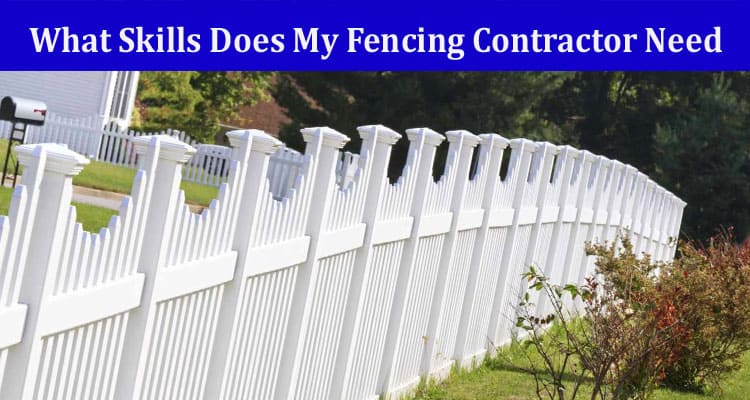Fencing contractors handle new fence installations, repairs, and maintenance services. To meet customer needs, a fence contractor needs various skills, including communication, problem-solving, teamwork, budgeting, time management, and more. Here is more information about the skills a fence contractor should have:
1. Good Communication
The process of hiring fencing contractors involves asking questions about their scope of service, project timeline, budget, local codes, permits, and certifications. The contractor’s scope of service determines whether they can handle your commercial, industrial, or residential fencing project. Project timeline discussions help you assess how the installation, repair, or maintenance will affect your business operations or personal schedule. Budget details give you an estimate of how much the project may cost and the types of materials the contractor can use. Experienced fencing companies follow local codes and are aware of the permits required for each project.
A contractor with good communication skills can help you navigate these factors and answer your questions about the project. Reputable contractors offer various customer service communication channels, like emails or calls, that you can use for inquiries when planning your project. Good contractors also demonstrate transparency and provide honest insights and assessments of the project before beginning.
2. Problem-Solving
Fencing projects involve extra consideration for details like landscaping, weatherproofing, and pest control. A good contractor finds solutions for the various problems they face during the project and provides suggestions for their clients. Landscaping issues they may encounter include underground utility lines, unstable or weak soil conditions, and outgrown roots that can push the fence out of place. Fence contractors should communicate with utility companies before digging holes or excavating to avoid damaging underground lines. The contractor can also reinforce the fence footing with compacted gravel to prevent it from moving or leaning.
An experienced fencing contractor can find solutions for weather issues like strong winds, heavy rains, or drainage issues. They may survey your property to determine the best installation location and suggest fencing materials that can withstand extreme weather conditions with minimal maintenance. If your area has termites or other pests that damage wooden fences, the contractor can spray a pesticide before installation. Pressure-treated wood is another solution fence contractors use to prevent insect damage. Look for a fencing company with experience dealing with various issues, from uneven property lines to mold, mildew, and rot.
3. Time Management
A good fencing contractor must be able to complete projects on time while maintaining quality outcomes. Experienced fence contractors secure all the permits and assess the local laws and property lines before starting groundwork. The contractor can save time and money by making sure all the legal and functional aspects are in order before beginning an installation. Contractors should start this process by reviewing your goals and inspecting the land and soil conditions. The contractor then develops a plan featuring all project requirements and phases.
Quality fencing companies schedule yard prep ahead of time and deliver all supplies to the site before the installation. They should consider your local weather and business schedules to avoid fencing project delays or disruptions. A contractor that prioritizes time management monitors the project and completes quality-assurance checks throughout the project to stay on track.
4. Project Budgeting
Fencing projects involve processes like obtaining permits, digging foundations, installing the fence, painting or staining, adding electric gate systems, and more. A fencing contractor can provide a rough cost estimate online or over the phone before visiting your site, where they can make more precise estimations. After site inspection, the contractor develops a plan with estimates for all supplies and services required for the project.
A good contractor is aware of the pricing for local permits and fencing materials. They can also help you determine how much you’ll spend on yard preparation, excavation, pest treatment, and labor. Experienced contractors can help you adjust your project goals to match your budget. They can suggest more budget-friendly materials like vinyl or aluminum instead of wood.
Find Reliable Fencing Contractors
Fence contractors can handle residential projects like patio railings, driveway gates, and property delineations. Look for contractors specializing in commercial and industrial fences for businesses, companies, farms, factories, and manufacturing plants. Choose a licensed, insured, and bonded fencing contractor with good communication, budgeting, time management, and problem-solving skills. Contact a fence contractor today to learn more about the fencing services they offer and their specialized skills.


